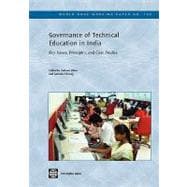
Note: Supplemental materials are not guaranteed with Rental or Used book purchases.
Purchase Benefits
Looking to rent a book? Rent Governance of Technical Education in India Key Issues, Principles, and Case Studies [ISBN: 9780821383414] for the semester, quarter, and short term or search our site for other textbooks by Blom, Andreas ; Cheong, Jannette. Renting a textbook can save you up to 90% from the cost of buying.
| Foreword | p. v |
| Acknowledgments | p. vi |
| About the Contributors | p. viii |
| Acronyms and Abbreviations | p. x |
| Executive Summary | p. xi |
| The Need for Change | p. xi |
| What Is Good Governance? | p. xi |
| Learning Forum Objectives | p. xii |
| Inputs and Process | p. xiii |
| Outcomes: The Nine Key Governance Issues | p. 1 |
| Outcomes for States | p. 3 |
| Outcomes for Institutions | p. 5 |
| Outcomes for the Consideration of the MHRD | p. 6 |
| Outcomes for TEQIP for NPIU/MHRD and the World Bank | p. 7 |
| Next Steps | p. 8 |
| A Common Language and Key Principles of Governance | p. 9 |
| A Common Language for Governance? | p. 9 |
| Key Principles and Challenges of Governance | p. 10 |
| State Case Studies | p. 16 |
| Andhra Pradesh | p. 16 |
| Haryana | p. 22 |
| Karnataka | p. 30 |
| West Bengal | p. 34 |
| National and International Case Studies | p. 39 |
| India | p. 39 |
| China | p. 45 |
| Japan | p. 51 |
| The Republic of Korea | p. 58 |
| European Trends in Governance in Higher Education | p. 63 |
| United Kingdom | p. 65 |
| Autonomy and Accountability in the United States of America | p. 69 |
| U.S. State of Virginia | p. 70 |
| Appendixes | p. 77 |
| List of Participants | p. 77 |
| Some Observations and Lessons for Future Learning Fora | p. 79 |
| Key Governance Issues Proforma | p. 84 |
| Tables | |
| Number, Type, and Intake of Higher Education Institutions | p. 18 |
| Growth of Indian Education | p. 40 |
| A Summary of Major Articles in the Educational Laws Related to Finance, Provision, and Quality Assurance in China's HEIs | p. 49 |
| Percentages of Institutions and Students by Institutional Ownership in Korea | p. 58 |
| Governmental Entities involved in Higher Education Regulations | p. 59 |
| Attendance in UK Higher Education | p. 65 |
| Higher Education Sector in Virginia, USA | p. 71 |
| Figures | |
| Governance Structure in Andhra Pradesh | p. 19 |
| Growth of Engineering Institutions in West Bengal | p. 35 |
| West Bengal: Governmental Entities Involved in Higher Education Regulations (Administrative Hierarchy for Management) | p. 36 |
| Governance Structure in Academic Operations: India | p. 41 |
| Structure of Governance of National Universities in Japan | p. 53 |
| Table of Contents provided by Ingram. All Rights Reserved. |
The New copy of this book will include any supplemental materials advertised. Please check the title of the book to determine if it should include any access cards, study guides, lab manuals, CDs, etc.
The Used, Rental and eBook copies of this book are not guaranteed to include any supplemental materials. Typically, only the book itself is included. This is true even if the title states it includes any access cards, study guides, lab manuals, CDs, etc.